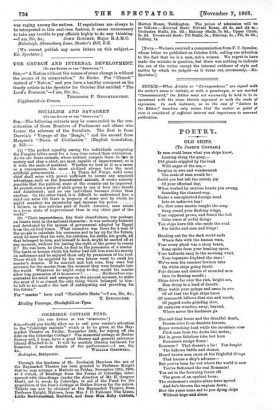SOCIALISM AND SAVAGERY
[TO TIER EDITOR Or visa "SPECTATOR:']
Sin,—The following extracts may be commended to the con- sideration of those Members of Parliament and others who favour the schemes of the Socialists. The first is from Darwin's " Voyage of the ' Beagle,'" and the second from Maspero's "Dawn of Civilisation" (English translation, p. 343) :-
(1) " The perfect equality among the individuals composing the Fuegian tribes must for a long time retard their civilisation. As we see those animals, whose instinct compels them to live in society and obey a chief, are most capable of improvement, so is it with the races of mankind. Whether we look at it as a cause or a consequence, the more civilised always have the most
artificial governments In Tierra del Fuego, until some chief shall arise with power sufficient to secure any acquired advantage, such as the domesticated animals, it seems scarcely possible that the political state of the country can be improved. At present even a piece of sloth given to one is torn into shreds and distributed ; and no one individual becomes richer than another. On the other hand, it is difficult to understand how a chief can arise till there is property of some sort by which ho might manifest his superiority and increase his power I believe, in this extreme part of South America, man exists in a lower state of improvement than in any other part of the world."
(2) "Their improvidence, like their cheerfulness, was perhaps an innate trait in the national character : it was certainly fostered and developed by the system of government adopted by Egypt from the earliest times. What incentive was there for a man of the people to calculate his resources and to lay up for the future, when he knew' that his wife, his children, his cattle, his goods, all that belonged to him, and himself to boot, might be carried off at any moment, without his having the right or the power to resent it ? He was born, he lived, he died in the possession of a master. The lands or houses which his father had left him were his merely on sufferance and he enjoyed them only by permission of his lord. Those which he acquired by his own labour went to swell his master's domain. If he married and had sons, they were but servants for the master from the moment they were brought into the world. Whatever he might enjoy to-day, would his master allow him possession of it to-morrow He therefore con- centrated his mind and energies on the present moment, to make the most of it as almost the only thing which belonged to him: he left to his mathm the task of anticipating and providing for the future."
For " master " here read "Socialistic State."—I am, Sir, &c., T. STENHOUSE.
Mickley Vicarage, Stocksfield-on-Tyne.
T. STENHOUSE.




























































 Previous page
Previous page